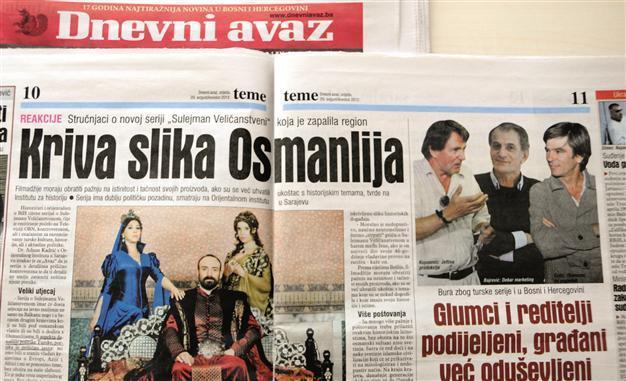Turkish drama now discussed in Bosnia
SARAJEVO - Anatolia News Agency

This photo shows the article in Bosnian daily Dnevni Avaz about ‘Magnificent Century,’ which has caused discuissions in the country on the first day it began airing. AA photo
The Turkish TV drama “Muhteşem Yüzyıl” (Magnificent Century), which sparked debate when it was first aired but soon become popular in many other countries, was beamed into homes in Bosnia Herzegovina on Aug. 27.The drama is aired on OBN, one of the most watched channels in the country, under the title “Süleyman Velicanstveni” (Süleyman the Magnificent), and was the highest rated TV series in Bosnia Herzegovina on its first day of broadcast.
In a written statement, OBN said research had revealed the drama “Magnificent Century” was the most watched series among women between the ages of 17 and 49 in the country.
Drama appears in media
The Bosnian media continued to cover the drama, which received a lot of interest in the country. Daily Dnevni Avaz published an article with the headline “The Ottoman’s Bad photography,” and spoke to viewers, academic and filmmakers about the Turkish drama.
Daily Dnevni Avaz’s article pointed out historical mistakes made in the drama, including the fact that the dresses worn by women were French fashion in the 19th century, the sultan wore trousers, and Süleyman was not 41 but 26 when he came to the throne.
The article also reminded readers that the drama had spurred controversial discussions in Turkey when it first aired. “The drama makes mistakes in historical events,” Sedad Beşliya, a researcher from Sarajevo Institute of History was quoted in the article as saying.
He said that historical TV dramas and films should not divert from reality. “It is not acceptable morally that the life of a sultan, who reigned for 46 years and spent most of his life on war fields, is limited to the depiction of the seraglio only. Also, the drama has no historical background and is incorrect.”
Sarajevo Oriental Institute member Dr. Adnan Kadriç said in the article that the drama would create reactions both in the Balkans and the other countries where the Ottoman Empire ruled. He said that the drama could only affect a viewer’s feelings. “The fact that the drama’s character is Kanuni may please some people and may disturb others. We can make logical criticisms if we can stay away its emotional dimension.”
















